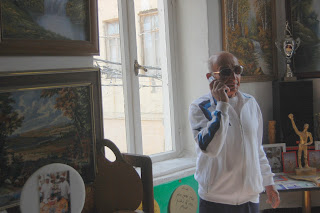Everything's Gold
The writer and poet Haim Heffer a bastion of secular Israeli culture from the “Palmach
generation”, passed away yesterday and today they are playing his songs on the
radio. When I first arrived in Israel and began to distinguish a few Hebrew words
in the songs I was hearing on the radio, many of them were his. I also cut my teeth on the maqamas that he wrote in Yedioth Aharonoth, in
which he’d comment in rhyme on current affairs – a form that seems hopelessly outdated
now but was taken seriously then. Even someone taking his first steps in the language
could recognize that Heffer was a master wordsmith with a prolific output. But,
for me, the sentiments expressed in many of his lyrics belonged too closely to
the 1948 generation, to times and places before my time, that were foreign to me. .
Not so with one song that I loved from the start : Hakol
Zahav (Everything’s Gold). Heffer wrote
the lyrics for the singing troupe Ha-Tarnegolim (The Roosters) under the direction of Naomi Polani. Since the Tarnegolim, who became wildly successful, started appearing only in 1960, I prefer to think that the song's upbeat message was not
intended to lift the nation’s morale but rather to simply lift the human spirit
in general in the wide-eyed style that the Tarnegolim were perfecting.
You can hear the original version here
Hakol Zahav’s music is the work of another master, the much
loved composer Sacha (Alexander)
Argov. Argov’s intricate but unforgettably jaunty melody and Heffer’s childish, irreverent
wordplay meshed to create an Israeli classic. The message is simple :
everything around you is beautiful if you have the eyes to see it. This
pre-dates the Beatles “There’s nothing
you can see that can’t be seen” by almost a decade.
Heffer niftily plants the word ‘gold’ throughout the song, almost creating the illusion in the mind of the listener that his/her own world is composed entirely of sunbeams. It also helps that the Hebrew word for orange ‘tapuz’ is an abbreviation of tapuah-zahav (golden apple). And then comes the C part where Heffer writes (in rough unrhymed translation)
"Not everyone who goes out into the street
Sees what his eyes meet
Mostly, a person goes out into the street
Distracted by his own concerns
I feel like getting up close to him
And telling him with a a big wide grin
What a night! What a sea!
What shade! How hot it is!
Go crazy you idiot!
Do nothing with everyone else!
Ring bells for no good reason!
Look around you man - everything is gold!"
(It sounds better in Hebrew)
(It sounds better in Hebrew)
Hearing these yelps of wonderment at the everyday ordinary, with lyrics that could almost be taken from from "Hair", Ha-Kol Zahav, which had been recorded a decade before I heard in, say 1973, stood head and shoulders above the sentimental, patriotic fodder of the time. And while I was conscious that someone who had heard Hendrix play live should not be enjoying a song with an 'umpa umpa' rhythm accompanied by an accordion, it was too late, I was hooked.... Looking back, it might not be too much of an exaggeration that Ha-Kol Zahav was an important part of my integration process, an Israeli song that seemed, somehow, to resonate with the "counter culture" that I was familiar with..
And maybe, in the rebellious universality of the message, also lies the secret of the endurance of Ha- Kol Zahav as new generations of musicians cover it in different styles.
And maybe, in the rebellious universality of the message, also lies the secret of the endurance of Ha- Kol Zahav as new generations of musicians cover it in different styles.
Here’s a clip from an Israeli film called 'Danny Hollywood' where the singers start off by parodying the original and then launch into a
rock version (You may have to copy it. Blogger doesn't want to insert videos)
http://www.youtube.com/watch?v=cUCGN09-mJU&feature=related
Photographers too are always on the lookout for the sort of golden light that lifts the spirit and think themselves lucky if is they stumble across it..





Comments